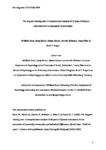The long and winding road: A comprehensive analysis of 50 years of Eysenck instruments for the assessment of personality
| dc.contributor.author | Ruch, W | |
| dc.contributor.author | Heintz, Sonja | |
| dc.contributor.author | Gander, F | |
| dc.contributor.author | Hofmann, J | |
| dc.contributor.author | Platt, T | |
| dc.contributor.author | Proyer, RT | |
| dc.date.accessioned | 2020-04-30T11:06:17Z | |
| dc.date.issued | 2021-02 | |
| dc.identifier.issn | 0191-8869 | |
| dc.identifier.other | 110070 | |
| dc.identifier.uri | http://hdl.handle.net/10026.1/15616 | |
| dc.description | 24 months embargo required. | |
| dc.description.abstract |
Instruments for the assessment of the Eysenckian superfactors of personality, Psychoticism (P), Extraversion (E), and Neuroticism (N), were developed over the course of almost 50 years. Typically the convergence with the precursor was examined when a new scale was published. In the present study the continuity and change of the substance of P, E, and N is tested by administering all instruments to a sample simultaneously, together with measures of the Five-Factor Model. A factor analysis of the 19 markers of the PEN model clearly yielded three factors, with higher loadings for E and N compared to P. The superfactors typically were measured purely after the historically second (or third, for P) instrument. Analysing the item difficulty confirmed that the P items were softened during the revisions but this created a confounding of item difficulty and content: The earlier “tough” items (mostly low Agreeableness) were gradually complemented by “softer” items representing the presumed obverse of P, superego strength (mostly low Conscientiousness). Finally, a part of the observed heterogeneity of P was due to these differences in item difficulty. Overall, the EPQ-R seems to be the most valid single measure of the PEN model. | |
| dc.format.extent | 110070-110070 | |
| dc.language | en | |
| dc.language.iso | en | |
| dc.publisher | Elsevier BV | |
| dc.subject | PEN model | |
| dc.subject | Extraversion | |
| dc.subject | Psychoticism | |
| dc.subject | Neuroticism | |
| dc.subject | Questionnaires | |
| dc.title | The long and winding road: A comprehensive analysis of 50 years of Eysenck instruments for the assessment of personality | |
| dc.type | journal-article | |
| dc.type | Journal Article | |
| plymouth.author-url | https://www.webofscience.com/api/gateway?GWVersion=2&SrcApp=PARTNER_APP&SrcAuth=LinksAMR&KeyUT=WOS:000600676300044&DestLinkType=FullRecord&DestApp=ALL_WOS&UsrCustomerID=11bb513d99f797142bcfeffcc58ea008 | |
| plymouth.volume | 169 | |
| plymouth.publication-status | Published | |
| plymouth.journal | Personality and Individual Differences | |
| dc.identifier.doi | 10.1016/j.paid.2020.110070 | |
| plymouth.organisational-group | /Plymouth | |
| plymouth.organisational-group | /Plymouth/Faculty of Health | |
| plymouth.organisational-group | /Plymouth/REF 2021 Researchers by UoA | |
| plymouth.organisational-group | /Plymouth/REF 2021 Researchers by UoA/UoA04 Psychology, Psychiatry and Neuroscience | |
| plymouth.organisational-group | /Plymouth/REF 2021 Researchers by UoA/UoA04 Psychology, Psychiatry and Neuroscience/UoA04 Psychology, Psychiatry and Neuroscience MANUAL | |
| plymouth.organisational-group | /Plymouth/Research Groups | |
| plymouth.organisational-group | /Plymouth/Research Groups/Plymouth Institute of Health and Care Research (PIHR) | |
| plymouth.organisational-group | /Plymouth/Users by role | |
| plymouth.organisational-group | /Plymouth/Users by role/Academics | |
| dcterms.dateAccepted | 2020-04-17 | |
| dc.rights.embargodate | 2022-4-29 | |
| dc.rights.embargoperiod | Not known | |
| rioxxterms.versionofrecord | 10.1016/j.paid.2020.110070 | |
| rioxxterms.licenseref.uri | http://www.rioxx.net/licenses/all-rights-reserved | |
| rioxxterms.type | Journal Article/Review |


